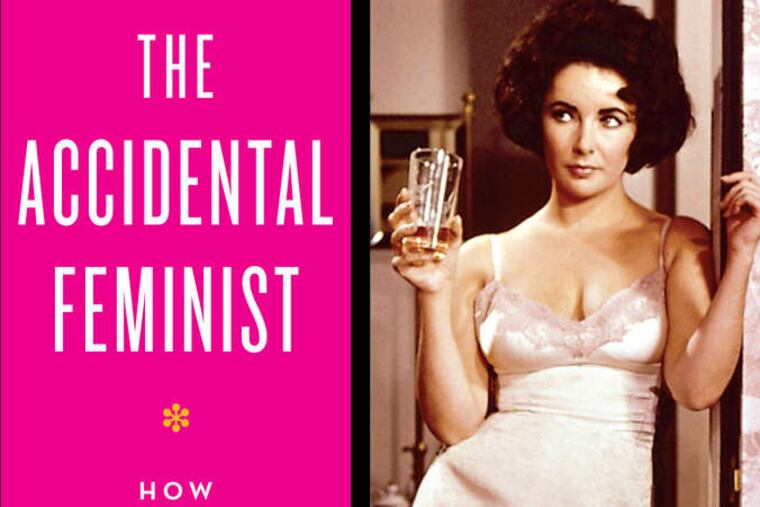Elizabeth Taylor, subversive feminist
I picked up The Accidental Feminist, the new book about Elizabeth Taylor by cultural critic M.G. Lord, because I hoped it signaled a new wave of feminism emerging in America.

How Elizabeth Taylor Raised Our Consciousness and We Were Too Distracted
by Her Beauty to Notice
By M.G. Lord
Walker & Co. 224 pp. $23
nolead ends nolead begins
Reviewed by Meredith Broussard
I picked up
The Accidental Feminist
, the new book about Elizabeth Taylor by cultural critic M.G. Lord, because I hoped it signaled a new wave of feminism emerging in America.
The time is right for a fourth wave; It's been a little more than 20 years since Susan Faludi's Backlash, and hemlines are up and heels are sky-high. A feminist movement always follows particularly oppressive fashion cycles. It's not all about fashion, though: The Occupy movement, Ron Paul, and the tea party have made social dissent hip again among millennials.
Heck, we could even look at smart-girl sex symbols such as Tina Fey and Zooey Deschanel as harbingers of an impending feminist resurgence.
Unfortunately for my fourth-wave fantasy, The Accidental Feminist is not a call to arms. Rather, it is an extended close reading of Elizabeth Taylor's entire career in film. It's not fair to blame an author for what I imagine a book ought to be, so by the end of the well-crafted first chapter I made my peace with Lord's project and settled in to read her explication of Taylor's films. Every single one of them. In order.
The project of the book is laid out in its subtitle: How Elizabeth Taylor Raised Our Consciousness and We Were Too Distracted by Her Beauty to Notice. The first chapter convinced me that Taylor was a subversively feminist star. Lord's research is impeccable: In addition to taking the reader through the intricacies of each film, she doles out tidbits culled from the Liz Taylor biographical oeuvre and sprinkles nuggets from original interviews throughout the book.
The second chapter, about the radical notions of women's agency represented by the character of Velvet Brown, the horse-loving girl who rides her hand-me-down horse to triumph in National Velvet, supported Lord's argument beautifully. By the third chapter, though, I felt the point had been made. Chapter 4, "A Place in the Sun, 1951," gets into the kind of close reading of filmic texts and details about censorship under the Hollywood Production Code that delight graduate students in cinema studies and make the rest of us wonder if it's maybe time to wander out to get some more popcorn.
At times, the rhetorical leaps were a bit of a stretch. Analyzing Taylor as Martha in the film version of Edward Albee's play Who's Afraid of Virginia Woolf?, Lord writes, "To me, the film's feminist message could not have been more explicit. Patriarchy crushes men and women alike. But reviewers at the time did not seem to notice this, and some projected their own paranoia onto the movie."
I'm willing to buy a feminist critique of a movie, but I'm reluctant to blame patriarchy for the marital discord between fictional characters in the film version of a play about marital drama and disillusionment.
The feminism in the book stalls at an undergraduate level. Lord, a boomer, writes that she began the book when she watched la Liz's "key movies" with a gaggle of Gen X and Y girlfriends. Presumably, those girlfriends' youth prompted her to explain exactly who Gloria Steinem and Virginia Woolf are, and why Betty Friedan's The Feminine Mystique (1963) was so important at the time. But as a Gen Xer myself, I wonder: What kind of adult woman, Gen X or otherwise, is going to pick up a book called The Accidental Feminist and not know who Gloria Steinem is?
Lord, whose other books include Forever Barbie: The Unauthorized Biography of a Real Doll and Astro Turf: The Private Life of Rocket Science, is clearly an expert on both Elizabeth Taylor and the era of screen censorship. The Accidental Feminist is a book for those who share her enthusiasm for Hollywood history or those stunning violet eyes.
The likely effect for nonenthusiasts: The Accidental Feminist will remind you that watching Taylor on-screen is pure joy, and will make you want to revisit Taylor's films. I plan to start with National Velvet.